The surge in GPT’s popularity (and, by extension, AI’s) is reshaping the digital landscape.
In this competitive era, companies are vying to innovate their digital products with GPT-based features, even spearheading entire projects centered around this technology. Keen on staying ahead in the race and seeking inspiration?
In our article, you will find a variety of inspiring business use cases of GPT implementation, from tech giants to local enterprises.
Ready to explore? Let’s embark on this journey!
GPT’s Surging Popularity: A Swift Journey to 100 Million Users
Before delving into business uses cases of GPT, we shouldn’t overlook the impact ChatGPT has had on the market. Its emergence catalyzed a surge of company investment into large language models like GPT, the foundational technology behind this revolutionary application from OpenAI.
ChatGPT has undeniably transformed the tech landscape in the past year, a transformation we’ve witnessed firsthand at DLabs.AI. It has proved its worth across an array of applications, from content creation and coding to managing daily tasks such as planning shopping lists, writing poetry, or crafting formal letters.
The breadth of its utility and impact is profound.
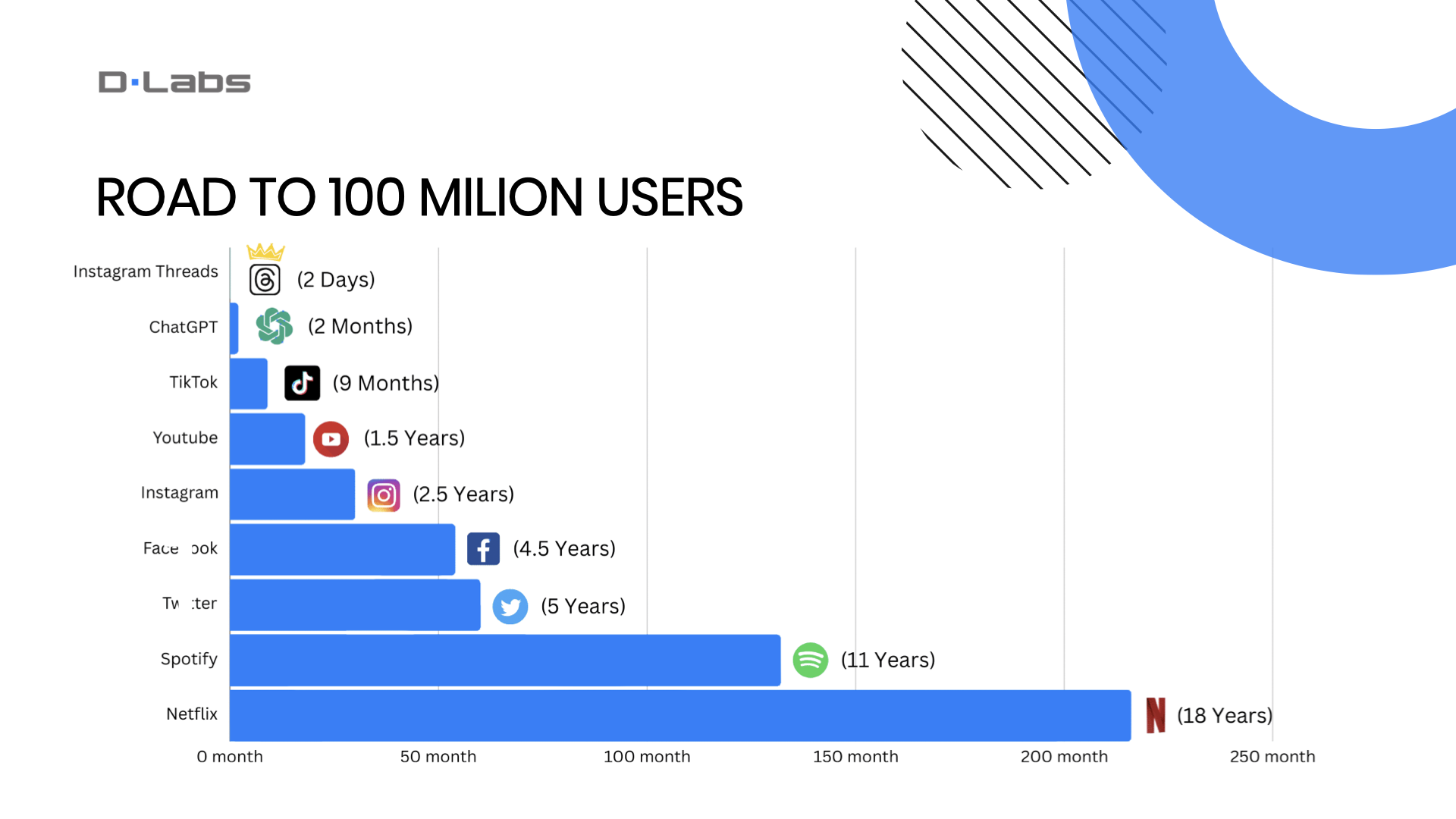

Turning our attention to the above chart, it’s clear that ChatGPT has set a blistering pace for user adoption. Remarkably, it reached the 100 million user milestone in just two months, a speed only surpassed by Instagram Threads.
That said, it’s important to note that Threads likely leveraged Instagram and Facebook’s massive platforms for promotion. ChatGPT’s rapid ascent, in contrast, underscores its intrinsic appeal and the groundbreaking nature of its technology.
Isn’t that an incredible achievement?
12 Real-World Examples of How Companies Use GPT in Their Businesses
1. Nabla Copilot: GPT-Powered Tool Turning Patient Conversations into Action
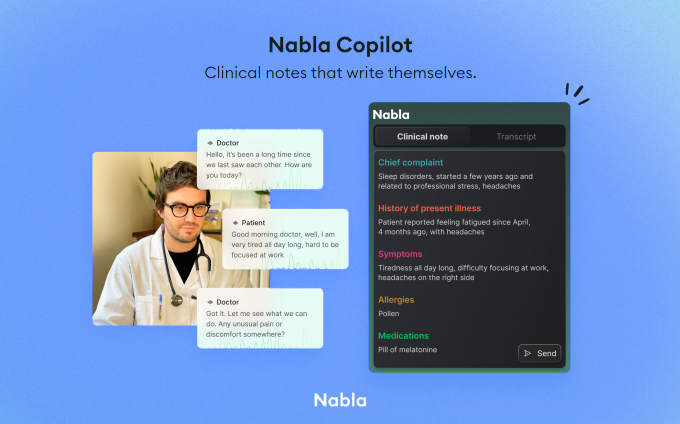

The first place on our list of GPT implementations features Nabla, an innovative digital health startup headquartered in Paris and co-founded by AI pioneer Alexandre Lebrun.
Nabla distinguishes itself as one of the earliest healthcare enterprises to harness the capabilities of GPT-3, deploying it within a groundbreaking tool designed to alleviate the administrative burden on physicians by dramatically decreasing paperwork.
This cutting-edge solution is fittingly named ‘Copilot.’ Conceived as a Chrome extension, Nabla Copilot is a virtual aide for medical professionals. During patient consultations, it efficiently converts spoken interactions into various written documents, including prescriptions, follow-up appointment letters, and detailed consultation summaries, all by leveraging the power of GPT-3.
Nabla’s journey with GPT-3 began in 2020, positioning them as early adopters of the technology, which now forms the backbone of the Copilot service. What’s even more captivating is Nabla’s forward-looking strategy. Alexandre Lebrun has shared their ambition to develop a bespoke language model exclusively for the healthcare sector, signaling a commitment to innovation and tailored solutions.
Despite being nascent, Copilot has made significant inroads within the healthcare community. It’s being utilized by practitioners not only in France but across the United States and has been embraced by approximately 20 clinics—both digital and traditional—boasting considerable medical teams.
This example not only illustrates the practical application of GPT technology in healthcare but also underscores the potential for specialized advancements in the field.
2. Amazfit – ChatGPT-Integrated Smartwatch
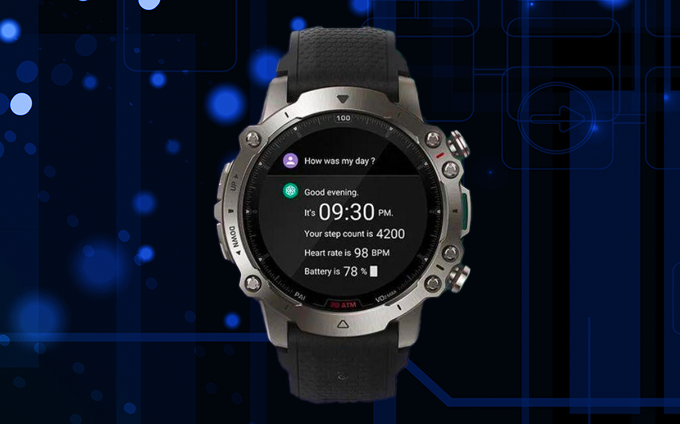

Diving deeper into GPT’s versatile applications, we shift our focus to an exciting development from Amazfit, which has introduced the world’s inaugural smartwatch face integrated with ChatGPT.
This innovative feature brings a touch of human-like, AI-generated interactions right to your wristwatch. With this integration, the watch face is capable of engaging in casual conversations, inquiring about your day, or offering greetings, all while displaying vital health and fitness metrics such as your step count, calories burned, and additional data.
What’s more, this smartwatch is equipped with voice recognition capabilities, allowing for seamless interaction with ChatGPT through simple voice commands. This feature enhances convenience, making it easier than ever to communicate with your device.
But the innovation doesn’t stop there. Not only does this watch face facilitate human-machine interaction through ChatGPT, but it was also developed using ChatGPT’s code-generation capabilities. That’s right—the AI played a role in its own programming!
So, as you can see, as AI and GPT models continue to evolve, their integration into everyday devices like smartwatches isn’t just on the horizon—it’s already here.
3. Duolingo Max: GPT-Powered Features for Personalized Language Learning
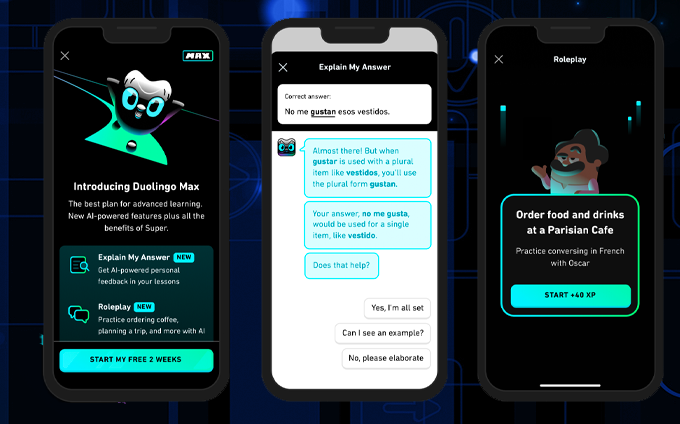

Now, let’s pivot to the EdTech sector and explore Duolingo’s exemplary use of technology. By harnessing the advanced capabilities of GPT-4, Duolingo has unveiled Duolingo Max, a feature that significantly elevates the language learning experience.
This initiative offers users a highly personalized and interactive approach to mastering new languages, setting a new standard in educational technology. It introduces innovative features like “Explain My Answer” and “Roleplay,” effectively providing a 24/7 language tutor that not only gives detailed feedback on answers but also engages users in immersive dialogues.
Initially, Duolingo cautiously launched these AI-enhanced features for only two languages, a strategic move that likely aimed at managing system demands and adhering to GPT’s token limitations to prevent overloading their tech infrastructure. What makes this example particularly noteworthy is the introduction of these advanced AI features within a new subscription tier.
This strategy showcases the potential of AI to not only elevate the user experience but also to forge new business models and unlock new revenue opportunities. Duolingo’s approach exemplifies the innovative ways AI can be integrated into products to benefit both the company and its customers.
4. Udacity’s AI Chatbot: Revolutionizing Learning with GPT-4 Turbo


Let’s delve deeper into EdTech, where Udacity has made a significant leap forward. The company has launched its AI chatbot, an innovative beta feature powered by GPT-4 Turbo, designed to redefine online learning.
This virtual tutor addresses the common challenges of online education by providing personalized support and guidance on demand.
Key features of Udacity’s AI chatbot include:
- Instant Support: Delivers real-time, personalized feedback to resolve complex issues, improving learning efficiency.
- 24/7 Accessibility: Serves as a constant supplement to human mentors, offering uninterrupted support.
- Scalable Interaction: With the ability to interact with an unlimited number of learners simultaneously, it broadens access to customized educational assistance.
- Diverse Learning Enhancements: Enhances the learning experience with features ranging from concept summarization and in-depth topic exploration to coding assistance.
These examples highlight the ongoing revolution in education, showcasing significant advancements right before our eyes.
5. Zoom AI Companion: New GPT-Powered Feature that Boosts Workplace Efficiency
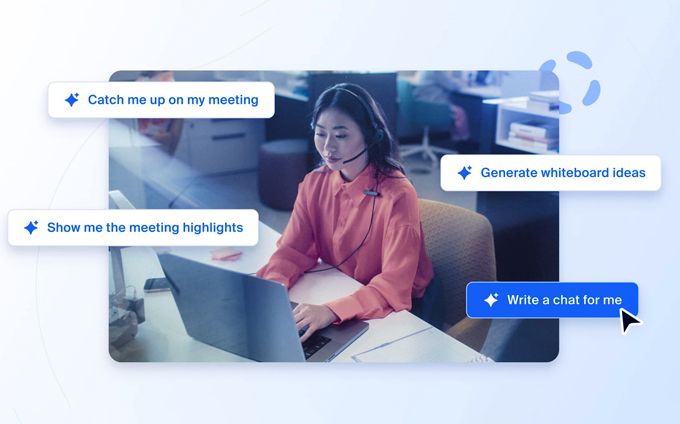

If you’re looking for ways to boost your productivity, it could be a game-changer. Zoom has developed a new feature known as the AI Companion, aimed at addressing common productivity challenges within the workplace.
This tool, which has evolved from the previously named Zoom IQ, integrates a generative AI assistant across the Zoom platform to assist users in streamlining repetitive tasks such as:
- Managing emails
- Preparing for meetings
- Creating meeting summaries
…and much, much more.
It also saves time by offering features like smart chapters for easier review, in addition to providing assistance in composing emails and chat responses.
This AI-powered feature is included at no extra cost in paid Zoom services, showcasing a different approach compared to Duolingo, which we mentioned before. So, it’s a great example of the potential of AI to transform the modern workplace by enhancing productivity and collaboration.
The question is: have you tried this feature yet?
6. Night Shift Brewing: Craft Beer Created by ChatGPT
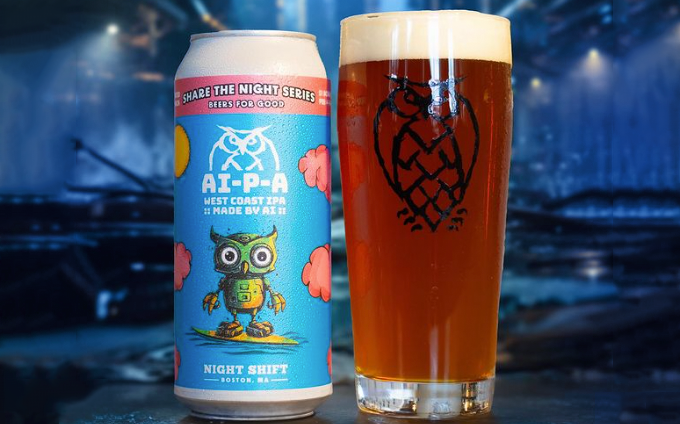

Venturing from the domain of work and learning into the realm of leisure, let’s talk about Night Shift Brewing, a brewery in Massachusetts born from a partnership between three roommates.
This team took a bold step by employing ChatGPT in their brewing process, venturing into uncharted territory to craft a new beer recipe. Despite initial hesitations concerning how this technological approach might be received—given the artisanal and hands-on nature of brewing—the outcome was remarkably successful.
With a few refinements, “AI-P-A” was born, marking a significant milestone in the brewery’s history. But the innovation didn’t stop at the recipe; AI was also leveraged to conceive the beer’s unique label and name, showcasing the versatile capabilities of AI in creative processes. Night Shift Brewing’s experiment sparked interest, drawing customers eager to sample this AI-inspired creation.
The overwhelmingly positive public response underscored the successful fusion of traditional brewing artistry with cutting-edge technology, demonstrating the potential of AI to inspire innovation in even the most unexpected sectors.
7. SugarAssist: GPT-Powered Diabetes Assistant
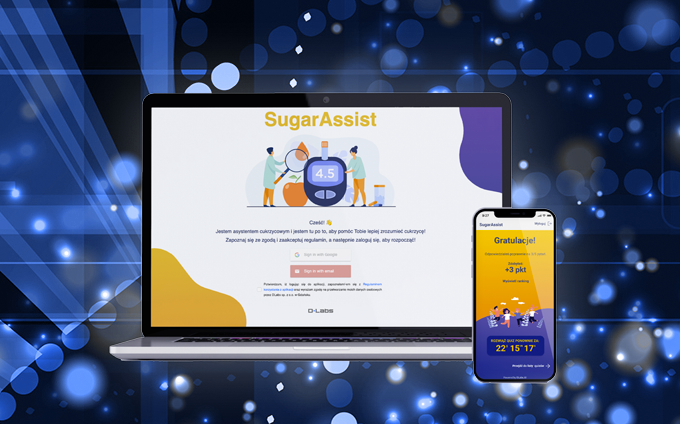

Now, let’s shift our focus to a healthcare initiative aimed at tackling significant challenges, all spearheaded by the team at DLabs.AI.
In Poland, a concerning issue is the steep rise in diabetes diagnoses. The healthcare system isn’t sufficiently educating newly diagnosed patients or their families, leaving them overwhelmed and unsure of how to manage their condition effectively.
In response, we’ve introduced SugarAssist, a diabetes management assistant powered by GPT. This advanced chatbot is crafted to guide patients and their families through the complexities of managing diabetes.
SugarAssist encompasses critical support areas, such as Knowledge Assistance for personalized advice on blood sugar monitoring and medication management and Sports Advisory to understand how physical activities affect diabetes, and it doesn’t end there.
SugarAssist also includes Emotional Support to help patients cope emotionally with the new diagnosis. This feature, alongside its commitment to providing verified information, positions SugarAssist as a trustworthy and indispensable tool for those navigating life with diabetes.
8. GPT-Based Student Assistant: Professional Guide to Finding the Perfect Educational Path
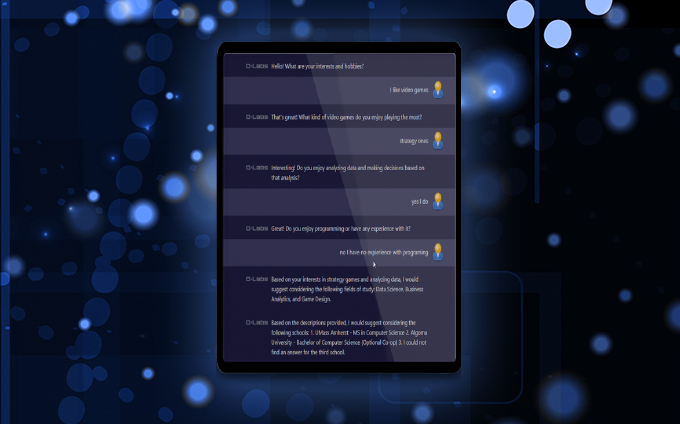

Another example from the DLabs.AI team comes from the EdTech industry. The problem we aimed to solve is the complex landscape of higher education, where finding the right academic path can be daunting for students.
Our solution? An AI-powered personal academic advisor. This innovative tool, leveraging GPT-3.5 Turbo, offers 24/7 personalized assistance, addressing the critical need for timely, accurate information and responsive support in educational decision-making.
Key features of the solution include:
- Comprehensive Details: Delivers detailed insights into courses, entry prerequisites, and faculty credentials.
- Personalized Recommendations: Customizes advice based on individual student goals and capabilities.
- Engaging Interaction: Ensures smooth, natural conversations for a better communication experience.
- Reliable Guidance: Incorporates an anti-hallucination mechanism to ensure the accuracy of the information provided.
What sets this advisor apart from standard ChatGPT queries about career paths? Beyond the highlighted features, our assistant leverages a specialized database enhanced with data embeddings, offering a deeper layer of personalization.
Unlike ChatGPT, it proactively asks questions to better understand the user, ensuring highly relevant educational recommendations. Interested in the development process behind this AI innovation? Here’s an article that details the step-by-step implementation of GPT using the project as a case study.
9. Boldly: AI-Powered Assistant for Premium Staffing


Next, let’s explore how we helped Boldly, a premium remote staffing company. Boldly encountered challenges with the significant time required for assistants to organize meetings for its executives. This was only complicated by assistants having to constantly switch contexts between clients and meetings.
To address the issue, we used GPT-4 to sift through email threads, offering real-time updates on the status of meeting arrangements. Our team developed software that not only auto-generates meeting records but also identifies key actions within emails, summarizing them in a bullet-pointed format for quick reference.
The primary benefits of the solution are clear: a considerable decrease in the amount of time assistants spend organizing tasks and a significant boost in the efficiency of meeting coordination—then, there’s a critical aspect that we haven’t touched on yet: that of data security.
To ensure comprehensive protection, our team has implemented data anonymization techniques to encrypt sensitive data, including personal information and sensitive company data. This ensures that all information remains fully secure. Interested in learning more about how we achieved this?
Take a closer look at the case study.
10. Slack AI: Streamlining Workplace Communication with Advanced AI
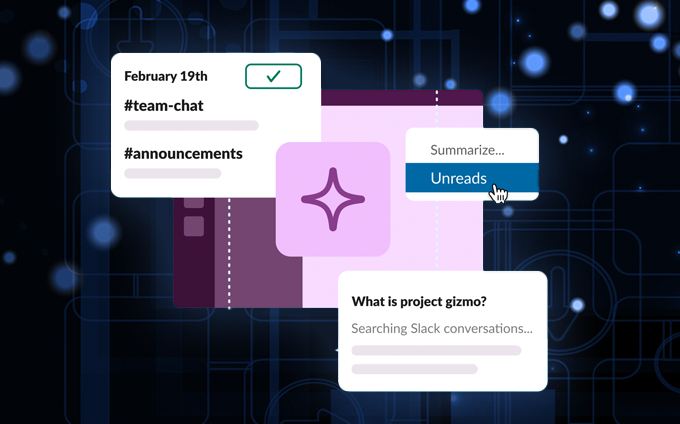

What if you communicate via instant messaging rather than email? Slack has the answer. They’ve introduced a GPT-powered AI app that could revolutionize your approach to workplace communication.
The innovative functionality is specifically designed to tackle the complexities and time demands of managing team interactions and workflows. Developed as an advancement from its foundational technology, Slack’s AI capabilities now seamlessly integrate into the platform.
They offer support in effortlessly handling various tasks, including:
- Quickly summarizing extensive threads and channels
- Efficiently preparing and summarizing meetings
- Offering smart search for fast, accurate responses
- Providing automatic recaps for crucial updates
This development exemplifies the transformative power of AI in reshaping the modern workplace by improving productivity and fostering better collaboration.
11. Klarna’s AI Assistant: GPT-Enhanced Support for Streamlined Customer Service
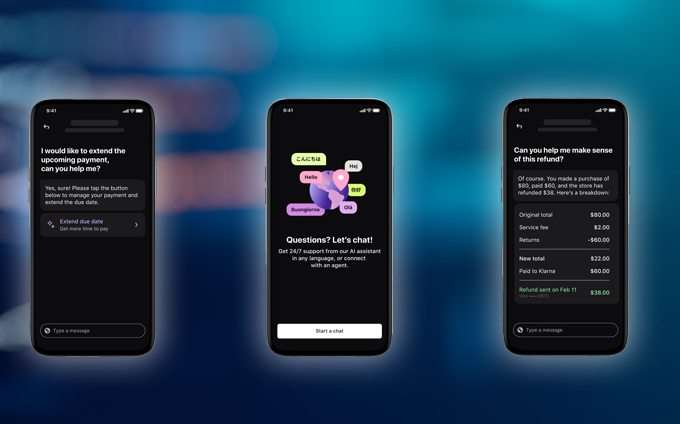

Diving into the forefront of GPT’s application in financial services, Klarna has innovatively integrated an AI assistant that’s revolutionizing the way customers interact with financial platforms.
Curious about its key features and results?
- AI Conversations: Over 2.3 million customer service chats have been managed by this AI, showcasing its ability to significantly lighten the workload equivalent to that of 700 full-time agents.
- Customer Satisfaction and Efficiency:
- Matches human agents in customer satisfaction scores.
- Increases accuracy in resolving inquiries, cutting down repeat questions by 25%.
- Reduces the time to resolve issues from 11 minutes to under 2 minutes.
- Global Accessibility:
- Operates 24/7 in over 23 markets.
- Offers support in more than 35 languages, improving outreach and connection with diverse communities.
- Projected to enhance Klarna’s profits by $40 million USD in 2024 due to increased efficiency and customer reach.
The AI assistant, seamlessly integrated within the Klarna app, is more than a customer service tool; it’s an embodiment of Klarna’s vision for an AI-enhanced financial ecosystem. This vision is aimed at saving time, reducing worries, and optimizing financial decisions for its 150 million consumers globally. Through tasks like managing refunds, returns, and providing real-time financial insights, Klarna is setting new standards for consumer-focused AI applications in the financial industry.
12. Booking.com’s AI Trip Planner: Enhancing the Travel Experience


Concluding our list, let’s dive into the exciting world of travel, specifically looking at Booking.com’s expansion of its mobile app capabilities with the introduction of the AI Trip Planner. The feature combines Booking.com’s machine learning technology with OpenAI’s ChatGPT to offer users personalized travel recommendations through natural language processing.
The AI Trip Planner is integrated within the Booking.com app, presenting users with a visual selection of accommodations matching their search queries, complete with pricing information and options for further details. Although the current functionality centers around accommodations, there are plans to expand it to include flights, ground transportation, and attractions directly through the chat interface.
This innovation is a key part of Booking.com’s wider strategy to simplify travel planning, aiming for an intuitive, connected, and user-friendly experience that prioritizes ethical and inclusive practices.
Feeling Inspired? Build Your Own GPT Solution
We hope our examples have inspired you and showcased the powerful and diverse capabilities of GPT. At DLabs.AI, we’ve successfully executed numerous projects that harness this technology, so if you’re looking for support, we’re here to help.
If you’re seeking support, we’re here to assist. Check out our GPT integration service and let’s start collaborating today!